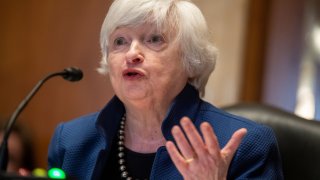
- Treasury Secretary Janet Yellen on Wednesday warned House Speaker Nancy Pelosi that the mere specter of a U.S. default can have drastic consequences.
- Yellen reiterated that lawmakers have until some point in October before the department exhausts its extended efforts to prevent what would be a historic default.
- "A delay that calls into question the federal government's ability to meet all its obligations would likely cause irreparable damage to the U.S. economy," Yellen wrote.
- Pelosi replied that addressing the ceiling "has to happen" and called upon Republicans to support an increase.
Treasury Secretary Janet Yellen on Wednesday warned House Speaker Nancy Pelosi that the mere specter of a U.S. default can have drastic consequences for U.S. financial markets and urged Democratic leadership to raise or suspend the debt ceiling as soon as possible.
Yellen reiterated that lawmakers have until some point in October before the department exhausts its extended efforts to prevent what would be a historic default.
"A delay that calls into question the federal government's ability to meet all its obligations would likely cause irreparable damage to the U.S. economy and global financial markets," Yellen told Pelosi, D-Calif., in a letter dated Wednesday.
Get Philly local news, weather forecasts, sports and entertainment stories to your inbox. Sign up for NBC Philadelphia newsletters.
"We have learned from past debt limit impasses that waiting until the last minute to suspend or increase the debt limit can cause serious harm to business and consumer confidence, raise short-term borrowing costs for taxpayers, and negatively impact the credit rating of the United States," she added.
Most economists say that a U.S. default could spark a severe economic downturn and send borrowing costs soaring across the American economy. Despite the dire consequences, lawmakers have made little progress.
Money Report
The ceiling prevents the Treasury from issuing new bonds to fund government activities once a certain debt level, or date, is reached. That level reached $22 trillion in August 2019 and was suspended until the end of July 2021.
The new debt limit includes Washington's additional borrowing since summer 2019. The Congressional Budget Office estimated in July that the new cap will likely come in just north of $28.5 trillion.
Asked about Yellen's letter during her weekly press conference, Pelosi said Wednesday that Democrats won't risk "the full faith and credit" of the U.S. government.
She called upon Republicans to support a debt-ceiling hike as Democrats did under former President Donald Trump, when the federal government accrued more than $7 trillion in debt.
"It has to happen," she said. "Hopefully [Republicans] will be responsible." The House speaker added that Democrats will not be including a debt-ceiling increase in their $3.5 trillion reconciliation bill, which will require a simple majority vote.
Votes to increase the debt ceiling do not authorize additional government spending. An increase allows the Treasury Department to continue to pay for its prior spending, akin to how consumers pay off credit card bills from the prior month.
Senate Majority Leader Chuck Schumer, D-N.Y., declined to answer a question Wednesday about whether the chamber would add a debt ceiling provision to a continuing resolution.
"We have a number of different ways we're going to look at getting the debt ceiling done," he said. "We must get it done."
Since the Treasury Department is not allowed to issue new debt before Congress suspends or increases the ceiling, Yellen and her lieutenants have invoked "extraordinary measures" to conserve cash and avoid busting the federal borrowing limit.
The extraordinary measures allow the Treasury to redeem certain investments in federal pension programs and halt new ones in order to generate cash without raising the overall debt. But when those methods are exhausted, there is no backstop.
Unless Congress addresses the ceiling, payments on Social Security, Medicare, military spending, interest on U.S. debt and other obligations simply halt.






